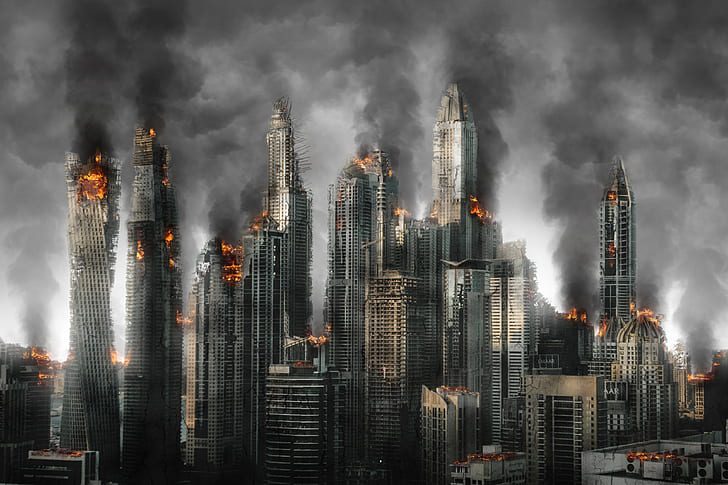Christmas has its secularist version. Apparently, Advent, a time for reflecting on the End Times, does too.
James Piereson and Naomi Schaefer Riley have written an opinion piece for the Wall Street Journal [behind a paywall] entitled Why Go to College if the World Is About to End?
They discuss a tweet from Notre Dame professor Alexander O. Hsu, who asked: “Given the very real risk of climate extinction due to capitalism, what are some defenses of business schools? What possible justification is there in making more businesspeople?”
The tweet went viral, racking up by today’s count 663.9 thousand views. The context seems originally to have been his defense of the humanities against the seemingly more practical business major. But lots of people today really believe that climate change will mean the extinction of the human race. And, like End Times preachers, many of them believe this will happen in their (brief) lifetime. In fact, like End Times preachers, they are predicting a date. In 2018, a UN panel predicted that the end would come in 2030.
A study from a couple of years ago from the medical journal Lancet surveyed 10,000 young people aged 16 to 25 from 10 countries about their perception of climate change. Over half said that they believe “humanity is doomed.” And 84% said they were “at least moderately worried,” with 60% being “very or extremely worried.” The future is “frightening” for 75% of these young adults.
And that fear of climate Armaggedon is affecting how they feel in the present. According to a story about the study, “More than half felt sad, anxious, powerless, helpless, and guilty about the climate. The feelings least reported were optimism and indifference.” To the point that 4 in 10 are considering not having children due to their fear of climate apocalypse.
Getting back to Piereson and Riley’s article, they write, “If one thinks the world will run out of time to save itself from climate catastrophe in 2030, as the U.N. Intergovernmental Panel on Climate Change declared in 2018, then there isn’t much point in going to college or planning for the future.” They see a parallel between the reception of Prof. Hsu’s tweet that majoring in business is futile in light of “climate extinction” and the Jehovah’s Witnesses, who counsel young people not to go to college, since the End is imminent.
The notion of End Times is, of course, a religious teaching, and it’s interesting that it persists even among secularists. The authors cite a book on the different versions of Millennialism published in the 1950s:
The belief that the world is ending has a long history in the West, dating to the ancient world and the Book of Revelation. Norman Cohn, in “The Pursuit of the Millennium” (1957), wrote that this outlook proceeds from the idea that the world is controlled by an evil power of great destructiveness—a demon that will eventually be overthrown on a specific date by God’s designated messengers. It usually happened that when the end didn’t arrive as predicted, leaders would recalculate their calendars and repeat the process.
Cohn noted that this outlook is also embedded in some of our modern secular ideologies, including fascism and communism, both of which identified demonic powers that had to be overthrown. It is also present to some degree in the climate movement, which designates capitalism as the great evil and identifies rolling dates when the world will end if nothing is done to end the burning of fossil fuels.
Fascists believe the evil power that controls the world and must be overthrown were the Jews. Communists believe that the demon is the middle class, the “bourgeoisie” who own property. They envision a bloody revolution, which would end in a Millennial paradise: the Thousand Year Reich or the Workers’ Paradise.
The various sects of today’s post-Marxists believe the demonic power is white people, men, or heterosexuals. The difference, as we blogged about, is that they lack a Millennial end point. Like those who believe climate change will lead to our extinction in six years, they have no hope.
Christians believe that an evil power runs rampant in the world–namely, sin, death, and the devil–but it does not control everything. God still reigns over His creation. But fallen human beings taint that creation with their cruelty, injustice, and destructiveness, all of which render any utopian Millennium that we might make–such as the Nazis and the Soviets attempted–into a nightmare. We ourselves are the evil power that must be overthrown.
And it will happen because the Creator Himself will intervene, returning in His incarnation to judge the world and to re-create it, raising the dead and creating new heavens and a new earth.
When Christ is taken out of the End Times, only the horrors of Armageddon remain, with our sins against the climate receiving a horrible punishment, or one ideological faction presuming to be the judge against all of the others and wreaking a bloody retribution. Human history has a tragic ending. With Christ, though, the End Times are something to long for.
Illustration: Burned High-Rise Buildings via PickPik, royalty-free photos













